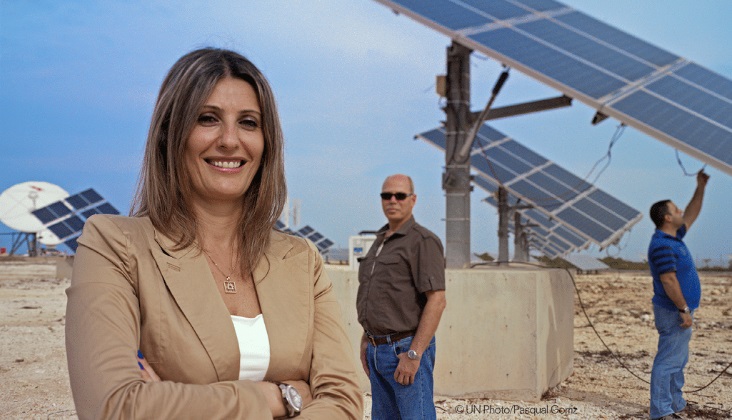

Goal 8: Promote inclusive and sustainable economic growth, employment and decent work for all
Roughly half the world’s population still lives on the equivalent of about US$2 a day with global unemployment rates of 5.7% and having a job doesn’t guarantee the ability to escape from poverty in many places. This slow and uneven progress requires us to rethink and retool our economic and social policies aimed at eradicating poverty.
A continued lack of decent work opportunities, insufficient investments and under-consumption lead to an erosion of the basic social contract underlying democratic societies: that all must share in progress. Even though the average annual growth rate of real GDP per capita worldwide is increasing year on year, there are still many countries in the developing world that are decelerating in their growth rates and moving farther from the 7% growth rate target set for 2030. As labor productivity decreases and unemployment rates rise, standards of living begin to decline due to lower wages.
Sustainable economic growth will require societies to create the conditions that allow people to have quality jobs that stimulate the economy while not harming the environment. Job opportunities and decent working conditions are also required for the whole working age population. There needs to be increased access to financial services to manage incomes, accumulate assets and make productive investments. Increased commitments to trade, banking and agriculture infrastructure will also help increase productivity and reduce unemployment levels in the world’s most impoverished regions.

The 16th Conference on International Exchange of Professionals held in April 2018 in Shenzhen. Talents from all over the world gathered in the exhibition halls. (Source: Shenzhen Municipal Bureau of Human Resources and Social Security)
Facts and figures
●The global unemployment rate in 2017 was 5.6%, down from 6.4% in 2000.
●Globally, 61% of all workers were engaged in informal employment in 2016. Excluding the agricultural sector, 51% of all workers fell into this employment category.
●Men earn 12.5% more than women in 40 out of 45 countries with data.
●The global gender pay gap stands at 23 per cent globally and without decisive action, it will take another 68 years to achieve equal pay. Women’s labour force participation rate is 63 per cent while that of men is 94 per cent.
●Despite their increasing presence in public life, women continue to do 2.6 times the unpaid care and domestic work that men do.
●470 million jobs are needed globally for new entrants to the labor market between 2016 and 2030.

Goal 8 targets
●8.1 Sustain per capita economic growth in accordance with national circumstances and, in particular, at least 7 per cent gross domestic product growth per annum in the least developed countries
●8.2 Achieve higher levels of economic productivity through diversification, technological upgrading and innovation, including through a focus on high-value added and labour-intensive sectors
●8.3 Promote development-oriented policies that support productive activities, decent job creation, entrepreneurship, creativity and innovation, and encourage the formalization and growth of micro-, small- and medium-sized enterprises, including through access to financial services
●8.4 Improve progressively, through 2030, global resource efficiency in consumption and production and endeavour to decouple economic growth from environmental degradation, in accordance with the 10-year framework of programmes on sustainable consumption and production, with developed countries taking the lead
●8.5 By 2030, achieve full and productive employment and decent work for all women and men, including for young people and persons with disabilities, and equal pay for work of equal value
●8.6 By 2020, substantially reduce the proportion of youth not in employment, education or training
●8.7 Take immediate and effective measures to eradicate forced labour, end modern slavery and human trafficking and secure the prohibition and elimination of the worst forms of child labour, including recruitment and use of child soldiers, and by 2025 end child labour in all its forms
●8.8 Protect labour rights and promote safe and secure working environments for all workers, including migrant workers, in particular women migrants, and those in precarious employment
●8.9 By 2030, devise and implement policies to promote sustainable tourism that creates jobs and promotes local culture and products
●8.10 Strengthen the capacity of domestic financial institutions to encourage and expand access to banking, insurance and financial services for all
●8.A Increase Aid for Trade support for developing countries, in particular least developed countries, including through the Enhanced Integrated Framework for Trade-Related Technical Assistance to Least Developed Countries
●8.B By 2020, develop and operationalize a global strategy for youth employment and implement the Global Jobs Pact of the International Labour Organization
DECENT WORK AND ECONOMIC GROWTH: WHY IT MATTERS
In 2018, 20 per cent of the world’s youth were not engaged in either education, employment or training

(UN Photo / Eskinder Debebe)
What’s the goal here?
To promote inclusive and sustainable economic growth, employment and decent work for all.
Why?
Sustained and inclusive economic growth can drive progress, create decent jobs for all and improve living standards.
While real GDP per capita and labour productivity have increased globally, 731 million people remain below the US$1.90 poverty line.
How many people are unemployed?
The global unemployment rate has finally recovered from the global financial crisis of 2009. In 2018, it stood at 5 per cent—matching the pre-crisis level. However, large disparities exist across regions and age groups. In 2018, the unemployment rates in Northern Africa and Western Asia and Latin America and the Caribbean were over 2.5 times higher than those in Central and Southern Asia.
Are jobs enough?
Having a job does not guarantee a decent living. In fact, 8 per cent of employed workers and their families worldwide lived in extreme poverty in 2018.
In addition to creating jobs, we also need to improve conditions for more than 700 million women and men who are working, but not earning enough to lift themselves and their families out of poverty.
In addition, women and girls must enjoy equal access to equal opportunities with men and boys for employment.

I have a job. Why does this matter to me?
Society as a whole benefits when more people are being productive and contributing to their country’s growth. Productive employment and “decent work” are key elements to achieving fair globalization and poverty reduction. In addition, unemployment can lead to unrest and disrupt peace if it is left unaddressed.
What does “decent work” mean?
Decent work means opportunities for everyone to get work that is productive and delivers a fair income, security in the workplace and social protection for families, better prospects for personal development and social integration. It is also important that all women and men are given equal opportunities in the workplace. A continued lack of decent work opportunities, insufficient investments and under-consumption lead to an erosion of the basic social contract underlying democratic societies: that all must share in progress.
What can we do to fix these issues?
Providing youth the best opportunity to transition to a decent job calls for investing in education and training of the highest possible quality, providing youth with skills that match labour market demands, giving them access to social protection and basic services regardless of their contract type, as well as levelling the playing field so that all aspiring youth can attain productive employment regardless of their gender, income level or socio-economic background.
Governments can work to build dynamic, sustainable, innovative and people-centred economies, promoting youth employment and women’s economic empowerment, in particular, and decent work for all. Local authorities and communities can renew and plan their cities and human settlements so as to foster community cohesion and personal security and to stimulate innovation and employment.
Source: un.org (unless otherwise credited)
Copyright © 2005-2021 IMCC. All Rights Reserved.粤ICP备15048427号 ruizim.net


